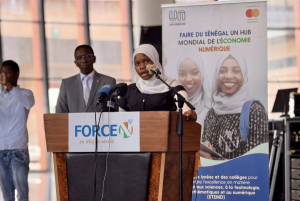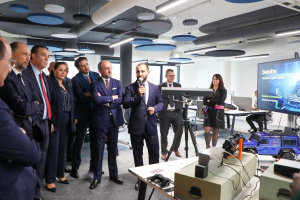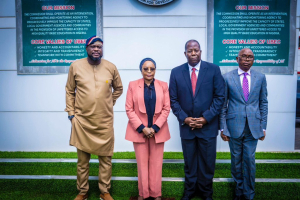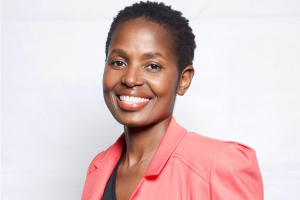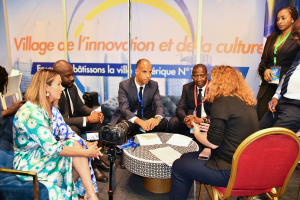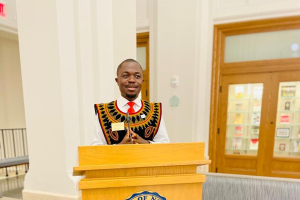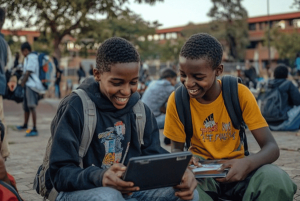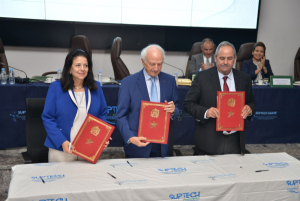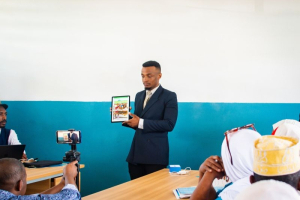Senegal Launches Digital and AI Training for 105,000 Teachers
• Senegal launched a $233 million national program to train 105,000 teachers and administrators in digital tools and artificial intelligence.
• The program is part of the government’s Education Digital Strategy 2025–2029 and includes distributing computers to science students.
• Connectivity gaps remain a challenge, as 40% of Senegal’s population lacked internet access in 2023, according to the ITU.
Senegal’s government is accelerating its digital transformation strategy through new capacity-building initiatives. In August, authorities already organized digital training for members of parliament.
On September 30, the Ministry of National Education (MEN) officially launched a national program to train teachers in digital skills and artificial intelligence. The initiative also includes providing computers to students in science tracks. Officials described the program as the operational start of the country’s Education Digital Strategy 2025–2029, which carries a budget of CFA130 billion (about $233 million) announced in January.
The program stems from a partnership signed in March 2025 between the Ministry of National Education and the Ministry of Higher Education, Research, and Innovation. It targets 105,000 teachers and administrative staff to integrate digital tools and AI into teaching and school management.
The online training will be accessible via computers, tablets, or smartphones connected to the internet. It includes interactive content, self-learning modules, and certified assessments. Teachers will learn to adapt their methods to technological changes, use digital resources to enrich learning, raise student awareness of digital and AI issues, and strengthen cybersecurity and data protection in schools.
“The final objective of this initiative is to integrate digital tools directly into the classroom, not only to modernize teaching but also to create an ecosystem adapted to 21st-century requirements,” the ministry said. “This program is not limited to teacher training. It represents a paradigm shift that will allow Senegalese students to move from being simple consumers of technology to becoming creators and innovators.”
Successful implementation depends on several factors. Access to compatible devices, the cost of internet connections, digital literacy, and telecom coverage remain significant barriers. According to the International Telecommunication Union (ITU), nearly 40% of Senegal’s population lacked internet access in 2023.
This article was initially published in French by Isaac K. Kassouwi
Adapted in English by Ange Jason Quenum
Deloitte Launches CyberAcademy in Morocco to Address Africa's Skill Gap
-
Deloitte launched its CyberAcademy in Casablanca on September 19, 2025, to train cybersecurity professionals across Africa.
-
The academy offers over 60 certified training programs, integrating AI and aligning with international certifications.
-
The initiative supports the Deloitte Morocco Cyber Center's goal of expanding its expert team to over 450 by 2025 and leverages Morocco's Tier 1 global cybersecurity ranking.
Africa faces a significant challenge with the scarcity of specialized cybersecurity skills amid escalating cyber threats. Training represents a critical priority for building a resilient and secure digital ecosystem across the continent.
Deloitte, a global audit, consulting, and technology services firm, inaugurated its CyberAcademy in Casablanca on September 19. The academy operates under the umbrella of the Deloitte Morocco Cyber Center. This specialized cybersecurity training center targets professionals, students, recent graduates, and individuals undergoing professional retraining. Companies currently struggle to recruit qualified talent in the sector.
The CyberAcademy offers more than 60 certified training courses. These programs cover technical, organizational, regulatory, and strategic aspects of cybersecurity. Some modules already incorporate artificial intelligence, and customizable programs adapt to specific business needs. The academy leverages recognized academic partnerships and international certifications (ISC², ISACA, PECB, etc.) to ensure the quality of its curriculum.
This launch aligns with the ongoing momentum of the Deloitte Morocco Cyber Center, which first opened in February 2023. The center currently employs approximately 100 Moroccan and African engineers, with women constituting about 50% of the workforce. It aims to reach over 450 experts by 2025. Furthermore, Morocco has advanced in global cybersecurity rankings. The Global Cybersecurity Index 2024, published by the ITU, assigned Morocco a score of 97.5 out of 100, placing it among the international reference countries (Tier 1).
Deloitte intends to address a proven skills deficit with this academy. Many companies and institutions find it challenging to recruit advanced cybersecurity profiles. This difficulty stems from the proliferation of cyberattacks, digital fraud threats, and heightened regulatory requirements. The country's accelerated digital transformation also drives this need, evidenced by high internet penetration, widespread use of online services, and increasing digitization of public services.
This article was initially published in French by Samira Njoya
Adapted in English by Ange Jason Quenum
Nigeria Signs Deal to Equip 47 Million Students and Teachers With Digital Devices
-
Nigeria, DLN ink deal to supply 47M laptops, tablets for schools
-
Hybrid internet plan: 5G, local telecoms, Starlink satellites
-
Success hinges on broadband, funding, and teacher training
Nigeria has signed a landmark agreement to roll out what could become Africa’s largest digital education program, aiming to provide laptops and tablets to nearly 47 million students and teachers.
UBEC and Digital Learning Network (DLN) have signed a landmark MoU to launch the National Digital Education Transformation Project.
— AISHA GARBA (@AishaMGarba) September 2, 2025
In line with the Renewed HOPE agenda of President Bola Ahmed Tinubu, this pioneering public-private partnership will deliver digital devices,… pic.twitter.com/SY8KjpW4Ep
The Universal Basic Education Commission (UBEC) and U.S.-based Digital Learning Network (DLN) signed a memorandum of understanding in Abuja on Sept. 1 to launch the “Free Laptops” initiative. The project includes teacher training, regional hubs for device assembly and distribution, and hybrid internet infrastructure combining 5G, local telecoms, and SpaceX’s Starlink satellites. The plan targets minimum speeds of 50 Mbps for schools, even in rural areas.
“This initiative is more than just technology. It is a promise of access, equity, and opportunity for every Nigerian child,” UBEC Executive Secretary Aisha Garba said.
Less than half of Nigeria’s public primary schools currently have digital equipment. The government aims to equip 95% of Nigerians with digital skills by 2030, in line with President Bola Ahmed Tinubu’s “Renewed Hope” agenda.
While the project underscores Nigeria’s push for digital inclusion and education-led economic growth, success will hinge on overcoming challenges including uneven broadband access, sustainable financing, and adequate teacher training.
Samira Njoya
Malawi’s Sanga Kanthema Reinvents Medical Devices for Africa
Malawian engineer and entrepreneur Sanga Kanthema is reshaping healthcare in southern Africa through biomedical innovation and robotics. Based in Blantyre, he leads Dolphin Health Innovation, a start-up designing smart medical devices for low-resource environments.
Kanthema, who works at the intersection of electronic engineering and equipment manufacturing, focuses on building tools that meet the realities of rural Africa. Since founding Dolphin Health Innovation in 2018, he has pushed to equip healthcare systems with telehealth technologies tailored for areas with weak infrastructure.
His company develops real-time ECG sensors that can transmit cardiac signals remotely, even in zones with limited connectivity. These devices rely on algorithmic data compression and intuitive mobile interfaces, allowing for continuous monitoring, early diagnosis, and remote intervention.
Kanthema also founded Qubix Robotics in 2022 to drive local manufacturing. The company builds CNC machines, 3D printers, and robotic systems to automate industrial production across healthcare, transport, and telecom sectors. Its mission: to strengthen Africa’s industrial independence.
Beyond entrepreneurship, Kanthema champions tech education. As a TME Education ambassador, he promotes electronics training in underserved regions. He also represents IdeaXme, a global network supporting socially-driven science and innovation.
This article was initially published in French by Melchior Koba
Edited in English by Ange Jason Quenum
How Sifiso Danisa Uses Tech to Keep African Languages Alive
South African entrepreneur Sifiso Danisa has turned her attention to a field often overlooked: teaching African languages to children. Through Limu Lab, the edtech start-up she co-founded with Sphumelele Sibeko in 2020, Danisa is working to bridge the cultural and educational gap that leaves many African children disconnected from their mother tongues.
As CEO of Limu Lab, Danisa leads a company that blends technology with tradition. The platform uses animation, music, gamification, and storytelling to make the learning of African languages fun, modern, and accessible. The inspiration came from Danisa’s own frustration with the lack of digital resources in African vernacular languages.
Limu Lab’s name—drawn from Nguni and Swahili, where “Limu” means “language”—reflects its core mission: to preserve and pass on Africa’s rich linguistic heritage to the next generation through innovative tools designed for early education.
Limu Lab has developed a mobile app available on both iOS and Android, designed to make language learning immersive and fun for children. The app features a rich variety of interactive content—animated stories, educational games, karaoke, e-books, songs, and hands-on crafts. A standout feature is its universe of African characters, presented through short films and educational adventures that help children see themselves reflected in what they learn.
The platform currently offers content in English, Afrikaans, isiZulu, and Sesotho, with more African languages being added regularly to expand its reach across the continent.
Sifiso Danisa, the driving force behind Limu Lab, holds a Bachelor of Commerce degree from the University of South Africa (2003) and earned her MBA from GIBS Business School in 2020. She began her career at global logistics giant A.P. Moller - Maersk, where she rose through the ranks from Account Manager to Customer Services Team Leader and Process Improvement Specialist before leaving in 2014.
This article was initially published in French by Melchior Koba
Edited in English by Ange Jason Quenum
Ivory Coast: Ynov Campus and Digital Academy Set to Boost Tech Talent in Grand-Bassam
• Ivory Coast and French group Ynov Campus signed an agreement to open the first Ynov Campus in sub-Saharan Africa.
• A second deal with the Magic System Foundation will launch a Digital Academy to train youth in digital skills.
• These projects aim to create 40,000 jobs and attract $1.6 billion in investment by 2028.
Ivory Coast has taken two bold steps to tackle the digital skills gap and fuel its economic growth.
Authorities signed two major agreements to train local youth in tech and prepare the country for a digital future. The Village of Information Technologies and Biotechnology (VITIB), based in Grand-Bassam, signed a deal with French training powerhouse Ynov Campus.
This agreement will establish the first Ynov campus in sub-Saharan Africa. Ynov will offer hands-on training in digital fields like web development, data science, digital design, audiovisual production, cybersecurity, and artificial intelligence.
Officials sealed the deal during the inaugural Ivoire Tech Forum held in Abidjan from July 9 to July 11.
A second agreement between VITIB and the Magic System Foundation will launch the VITIB Digital Academy. This academy will boost local digital skills, help youth integrate into the job market, and improve employability in high-demand tech sectors.
Both projects form part of VITIB’s larger expansion strategy. The site already hosts 96 companies, five data centers, and a one-stop-shop for business setup. VITIB's 2023–2028 plan, budgeted at CFA180 billion ($320 million), seeks to transform Grand-Bassam into a fully integrated smart city.
VITIB wants to create 40,000 jobs and attract $1.6 billion in investment over the next three years.
As digital transformation accelerates, Ivory Coast is under pressure to build a tech-savvy workforce that meets international standards. The Ministry of Digital Transition plans to train thousands in cybersecurity, cloud computing, data management, advanced programming, and AI.
Authorities have made digital upskilling a national priority. They want to support startup growth, ensure digital sovereignty, and fully integrate into West Africa’s digital economy.
Samira Njoya
Bill Agha Empowers Cameroonian Youth Through Tech Innovation
Cameroonian tech entrepreneur Bill Agha is building a dynamic ecosystem for innovation, education, and entrepreneurship across his country. He runs contests, workshops, and training programs to meet the real needs of students and young tech project leaders.
Agha graduated in computer science from the University of Bamenda in 2019. In 2020, he founded the Tech Innovation Center (TiC) Foundation, a nonprofit that leverages technology to develop solutions tailored to African communities.
Since its launch, TiC Foundation has focused on nurturing tech talent and boosting digital entrepreneurship. The organization offers tools, training, and guidance adapted to Cameroon’s local realities.
TiC Foundation operates three main programs. The TiC Startup Accelerator Program (SAP) mentors early-stage startups, connects them with experts, and provides business training. The TiC Summit, a national innovation competition for high school students, blends project pitches with design thinking, prototyping, and entrepreneurship workshops. The third, TiC Bootcamp, delivers hands-on training to prepare young people for careers in tech.
Beyond TiC, Bill Agha serves as president of the Golden Toastmasters Club and works as technical lead and regional program coordinator at Open Dreams Educational, an organization that helps students in Cameroon and South Africa access international scholarships.
Agha combines his passion for technology and education to empower the next generation. Through TiC Foundation and Open Dreams, he has trained thousands of youths and supported more than 100 startups, playing a key role in shaping Cameroon’s emerging tech landscape.
This article was initially published in French by Melchior Koba
Edited in English by Ange Jason Quenum
Personalization, Data, Planning: How AI Is Transforming African Education
Personalization, Data, Planning: How AI Is Transforming African Education
Africa faces a deep education crisis. Student numbers surge, teachers are scarce, and infrastructure lags behind. In 2024, UNESCO reported that 58% of adolescents aged 15 to 17 in sub-Saharan Africa do not attend school. The continent counts 98 million children outside the education system. Many schools lack electricity, internet, and basic resources.
AI Offers a Lifeline for Overworked Teachers
Teacher shortages cripple African classrooms. UNESCO says Africa needs to recruit more than 16.5 million teachers by 2030 to keep up with population growth. AI cannot replace teachers, but it can help them. Automated grading, custom teaching materials, and lesson planning tools lighten the load. In Kenya, teachers use the Kalasik assistant—a chatbot that generates lesson plans and automates repetitive tasks.
AI Delivers Personalized and Inclusive Learning
AI adapts learning to each student’s needs. Overcrowded classrooms make individual attention impossible, but smart systems change that. Students access interactive exercises, tutorials, and tailored feedback—even after school hours. Personalized learning keeps students engaged and cuts dropout rates, especially in rural and marginalized communities.
In West Africa, the Kwame for Science assistant tutors science students in 11 countries. It boasts an 87% accuracy rate for its top-three answers and serves 750 users over several months.
Data-Driven Decisions Shape Education Policy
AI gives education leaders real-time data. Ministries of Education spot low-enrollment regions, forecast teacher demand, and allocate resources where they matter most. Predictive analytics shifts planning from reactive to proactive, using demographic and school data.
Governments Put AI at the Heart of Education Strategy
Several African nations now weave AI into their education plans. Kenya launched a national AI strategy for 2025–2030 with UNESCO, focusing on digital skills in schools. Zambia and Côte d’Ivoire have also prioritized education in their AI strategies, promoting data analysis and personalized learning. Nigeria develops AI skills and integrates AI in education through partnerships with universities and private companies. Senegal, Burkina Faso, and Congo have added AI in education to their digital roadmaps.
Major Hurdles Remain
Despite these advances, African education systems face steep challenges in scaling AI. To begin with, poor digital infrastructure slows down deployment in many regions. Moreover, Teacher training on digital tools remains insufficient. Finally, data privacy and ethics are often under-regulated and sustainable funding models for EdTech remain elusive.
AI solutions need heavy investment and a solid business model. Protecting student data requires strict ethical rules. Tools must fit local languages and cultures. Above all, governments, partners, investors, and the private sector must commit long-term support to move beyond pilot projects and build a sustainable education system.
Samira Njoya
Morocco to Launch Engineering School for Digital and AI Training
Morocco is stepping up efforts to make digital technology a key driver of development and technological independence. The country plans to open an engineering school focused on digital transition and artificial intelligence.
On July 4, Minister of Digital Transition and Administrative Reform Amal El Fallah Seghrouchni signed a partnership deal with Minister of Higher Education Azzedine El Midaoui and André Azoulay, president of the Foundation for Research, Development and Innovation in Science and Engineering (FRDISI). The agreement sets up the Higher School of Engineers in Digital Transition and Artificial Intelligence and launches specialized training programs.
The Ministry of Digital Affairs said the initiative aims to align academic programs with real-world needs. The goal is to match training to the demands of local regions, the economy, and national technology priorities.
This project supports Morocco’s “Digital Morocco 2030” strategy, which targets training 100,000 young people annually by 2030 and creating 240,000 digital sector jobs. The plan follows the National AI Forum held last week in Salé, where nine agreements were signed with public and private partners. The forum stressed the importance of building human capital and developing a national roadmap for ethical and responsible AI use.
The new school will train engineers who can create and implement innovative digital solutions across sectors like public services, healthcare, industry, and education. Morocco aims to solve internal challenges while preparing young people for the jobs of the future.
Beyond education, the project will boost Morocco’s digital sovereignty, drive innovation, and help position the country as a magnet for tech startups and regional R&D centers.
This article was initially published in French by Samira Njoya
Edited in English by Ange Jason Quenum
Comoros Launches E-Learning and EdTech Platforms to Modernize Schools
- Comoros unveils two digital platforms, E-Shiyo and E-Msomo, to expand education access and improve school governance.
- E-Shiyo offers online textbooks; E-Msomo tracks student data and automates academic reports.
- The initiative is part of the “Comoros Digital 2028” plan, with UNICEF backing and support from ANADEN.
Comoros takes a big step toward modern education by launching two digital platforms, E-Shiyo and E-Msomo. These tools aim to fix problems of access, fairness, and outdated systems in schools.
The Ministry of National Education leads this effort, with technical help from the National Agency for Digital Development (ANADEN) and funding from UNICEF. Their goal: improve education access and tighten governance.
E-Shiyo offers an online library of textbooks for pre-primary and primary students. Kids can access lessons anytime, anywhere, on any connected device.
E-Msomo digitizes school administration. It creates a centralized system for managing report cards, assigns each student a unique ID, and tracks academic results automatically. This system helps schools trace student progress, boost transparency, and support better decisions by education officials.
This push fits into the “Comoros Digital 2028” plan, which aims to grow the digital sector’s share of GDP to 5% by 2028. Across Africa, e-learning is booming. Ambient Insight projects the continent’s online learning market will top $1.5 billion by 2030.
Beyond just handing out digital books and report cards, these platforms improve governance. They consolidate data to measure school performance, cut errors, and allocate resources smarter.
Next steps include boosting internet access—currently only 35.7% of Comorians are online—equipping schools with digital gear, training teachers, and protecting student data.
This article was initially published in French by Samira Njoya
Edited in English by Ange Jason Quenum


